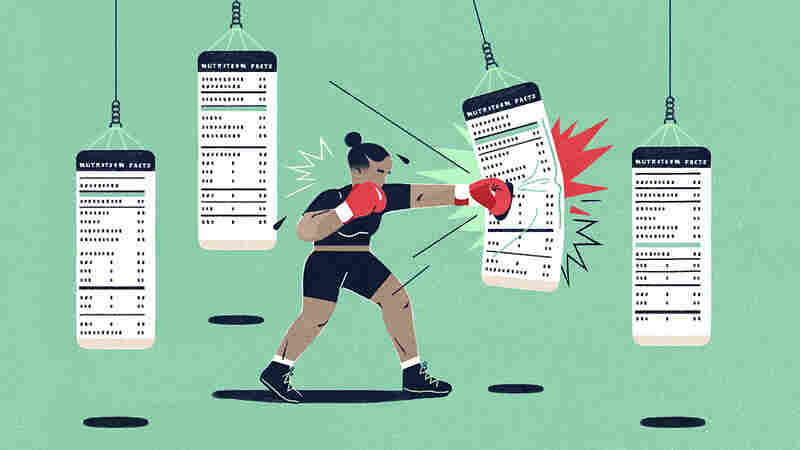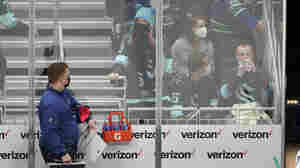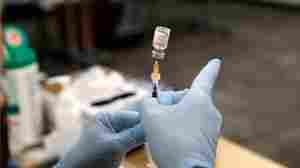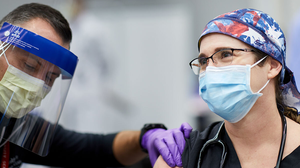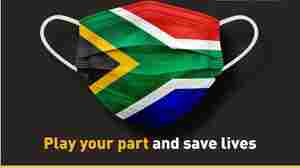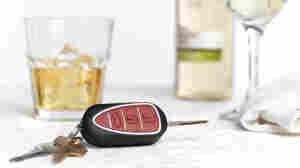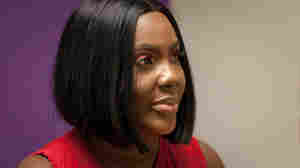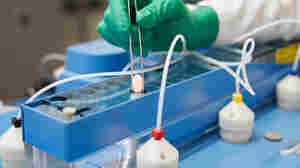How do you get a COVID-19 vaccine appointment? The answer varies by state. Frederic J. Brown/AFP via Getty Images hide caption
Health
"Congressional offices, Committees, and Agencies should immediately review their operations to adopt a maximal telework posture to reduce in-person meetings and in-office activities to the maximum extent possible," attending physician Brain Monahan said on Monday. Pablo Porciuncula /AFP via Getty Images hide caption
Seattle Kraken fan Nadia Popovici (center) looks toward Vancouver Canucks assistant equipment manager Brian "Red" Hamilton (left) at the end of an NHL hockey game in Seattle on Saturday. Popovici had written Hamilton a note months earlier urging him to see a doctor about a suspicious mole, which turned out to be cancerous. Ted S. Warren/AP hide caption
A nurse practitioner fills a syringe with the Pfizer COVID-19 vaccine at the Beaumont Health offices in Southfield, Mich., on Nov. 5. Jeff Kowalsky/AFP via Getty Images hide caption
Yanna McGraw is one of about a dozen full-time social workers working at libraries across the Midwest. A representative of the Public Library Association says over the past decade, more libraries have been finding ways to partner with social workers. Darian Benson/WFYI hide caption
A woman walks by a closed store in a shopping mall in Montreal, Sunday as the COVID-19 pandemic continues in Canada. Some new measures put in place by the Quebec government, including the closure of stores, go into effect today. Graham Hughes/AP hide caption
Stressed? Instead of distracting yourself, try paying closer attention
Dr. Anthony Fauci said on Sunday that the CDC was considering adding testing negative to its recommendations for when people could stop isolating after testing positive. Anna Moneymaker/Getty Images hide caption
22 tips for 2022: How to be kind to yourself and squash your critical inner voice
As the coronavirus pandemic drags on, there are still a lot of questions to be answered about how to keep kids safe. Cindy Ord/Getty Images hide caption
A pediatrician's advice to parents of kids under 5 on omicron, travel and day care
Travelers make their way through Miami International Airport on Tuesday. Airlines canceled more than 2,400 U.S. flights by midday on Saturday, according to the flight tracking website FlightAware. Joe Raedle/Getty Images hide caption
When Dr. Tiffany M. Osborn received her COVID-19 vaccination shortly after vaccines became available in late 2020, she felt hopeful about the pandemic's trajectory. A year later, she's sad and frustrated to see so many COVID patients in the ICU. Matt Miller / Washington University School of Medicine hide caption
ICU teams report fatigue and frustration as they brace for omicron surge
An public safety message from the government of South Africa. The country announced on Thursday that it was past the peak of its latest coronavirus surge. South African Government/Twitter hide caption
A colorized electron micrograph image of a cell (red) infected with with SARS-CoV-2 virus particles (yellow), isolated from a patient sample. Science Source hide caption
Trucks drive in front of Teva Pharmaceutical Logistic Center in the town of Shoam, Israel, on Oct. 16, 2013. On Thursday, a jury held Teva responsible for contributing to the opioid crisis. Dan Balilty/AP hide caption
Car keys are shown by glasses with alcohol in this stock photo illustration. Companies are developing technology that would allow cars to stop people from driving when drunk. Peter Dazeley/Getty Images hide caption
Victoria Gray, who has sickle cell disease, volunteered for one of the most anticipated medical experiments in decades: the first attempt to use the gene-editing technique CRISPR to treat a genetic disorder in the United States. Meredith Rizzo/NPR hide caption

